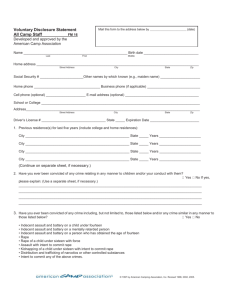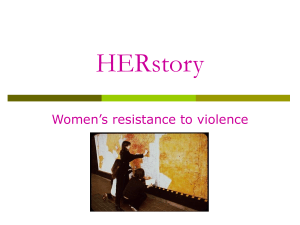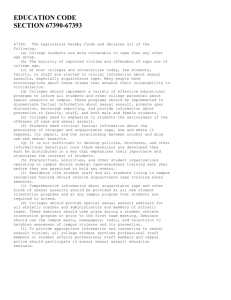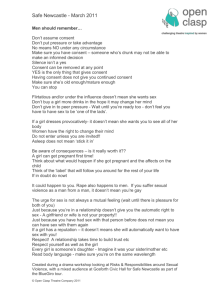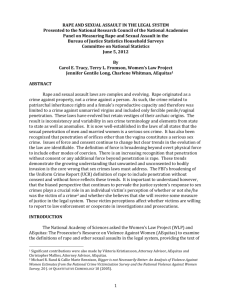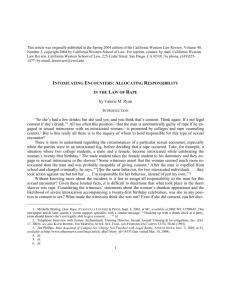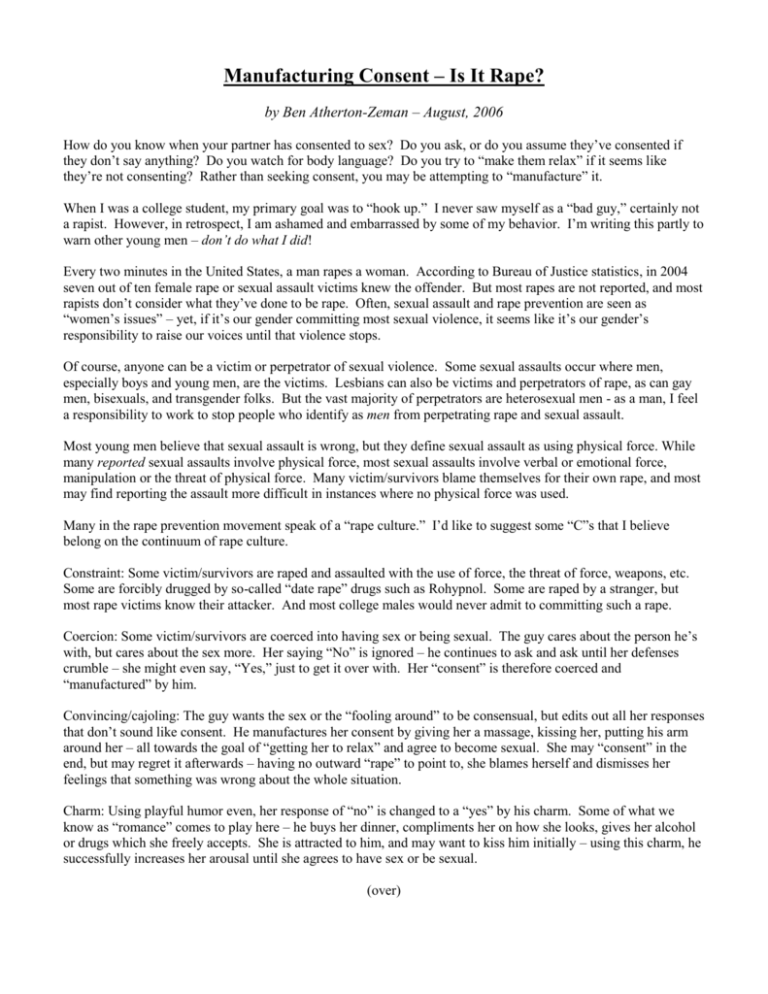
Manufacturing Consent – Is It Rape?
by Ben Atherton-Zeman – August, 2006
How do you know when your partner has consented to sex? Do you ask, or do you assume they’ve consented if
they don’t say anything? Do you watch for body language? Do you try to “make them relax” if it seems like
they’re not consenting? Rather than seeking consent, you may be attempting to “manufacture” it.
When I was a college student, my primary goal was to “hook up.” I never saw myself as a “bad guy,” certainly not
a rapist. However, in retrospect, I am ashamed and embarrassed by some of my behavior. I’m writing this partly to
warn other young men – don’t do what I did!
Every two minutes in the United States, a man rapes a woman. According to Bureau of Justice statistics, in 2004
seven out of ten female rape or sexual assault victims knew the offender. But most rapes are not reported, and most
rapists don’t consider what they’ve done to be rape. Often, sexual assault and rape prevention are seen as
“women’s issues” – yet, if it’s our gender committing most sexual violence, it seems like it’s our gender’s
responsibility to raise our voices until that violence stops.
Of course, anyone can be a victim or perpetrator of sexual violence. Some sexual assaults occur where men,
especially boys and young men, are the victims. Lesbians can also be victims and perpetrators of rape, as can gay
men, bisexuals, and transgender folks. But the vast majority of perpetrators are heterosexual men - as a man, I feel
a responsibility to work to stop people who identify as men from perpetrating rape and sexual assault.
Most young men believe that sexual assault is wrong, but they define sexual assault as using physical force. While
many reported sexual assaults involve physical force, most sexual assaults involve verbal or emotional force,
manipulation or the threat of physical force. Many victim/survivors blame themselves for their own rape, and most
may find reporting the assault more difficult in instances where no physical force was used.
Many in the rape prevention movement speak of a “rape culture.” I’d like to suggest some “C”s that I believe
belong on the continuum of rape culture.
Constraint: Some victim/survivors are raped and assaulted with the use of force, the threat of force, weapons, etc.
Some are forcibly drugged by so-called “date rape” drugs such as Rohypnol. Some are raped by a stranger, but
most rape victims know their attacker. And most college males would never admit to committing such a rape.
Coercion: Some victim/survivors are coerced into having sex or being sexual. The guy cares about the person he’s
with, but cares about the sex more. Her saying “No” is ignored – he continues to ask and ask until her defenses
crumble – she might even say, “Yes,” just to get it over with. Her “consent” is therefore coerced and
“manufactured” by him.
Convincing/cajoling: The guy wants the sex or the “fooling around” to be consensual, but edits out all her responses
that don’t sound like consent. He manufactures her consent by giving her a massage, kissing her, putting his arm
around her – all towards the goal of “getting her to relax” and agree to become sexual. She may “consent” in the
end, but may regret it afterwards – having no outward “rape” to point to, she blames herself and dismisses her
feelings that something was wrong about the whole situation.
Charm: Using playful humor even, her response of “no” is changed to a “yes” by his charm. Some of what we
know as “romance” comes to play here – he buys her dinner, compliments her on how she looks, gives her alcohol
or drugs which she freely accepts. She is attracted to him, and may want to kiss him initially – using this charm, he
successfully increases her arousal until she agrees to have sex or be sexual.
(over)
But what’s wrong with a little charm? Many girls and women say they love being “swept off their feet.” Many
even admit to saying “no,” when they are in fact playing a game – they want us (guys) to not take “no” for an
answer, to continue to woo and charm them.
And what’s the worst that can happen if we assume someone’s playing a game, and we’re mistaken? Or vice versa?
What’s the worst that can happen if we’re mistaken? Well, if we take someone’s “no” seriously, the worst that can
happen is that we won’t get to date this person. The worst that can happen if we assume she’s playing a game, and
continue despite the “no,” is that we may have sexually assaulted someone. That’s not something I’m willing to
live with.
Every rape can be prevented, and every rape victim suffers in ways the rest of us can only imagine. My colleagues
and friends who are survivors tell me that any kind of forced or coerced sex causes damage. It is difficult for many
survivors to trust anyone in any relationship afterwards. Some survivors suffer from post-traumatic stress
disorder – you don’t get that from a night of bad sex, you get that from a traumatic event akin to having been in a
war.
When I was in college, I never constrained anyone I wanted to be with. But, sadly, I did all four other things: I
charmed, cajoled, convinced and even coerced occasionally. I cared about the women I was with, but I also cared
about being with them sexually. I never would have fooled around with anyone without their consent, so where the
consent wasn’t immediately present, I manufactured it as best I could.
Guys! Don’t make the same mistakes I did. These five “C”s are dangerous for you and damaging for the women
and/or men you’re with. Choose instead some other “C”s:
Communication: Find out what your partner’s desires, preferences, moods are. You can be romantic and sexy
while also being communicative. Learn her/his bodily responses – when is s/he turned on? Turned off? Tense?
Check out your assumptions.
Consent: If you’ve been kissing and you want to fool around, ask if it’s okay. If you’ve been fooling around and
you want to have sex, ask if it’s okay. Better still, make the decision together as a couple, “should we?” Watch for
body language, tensing up, closing eyes, etc.
Choice: Even young men sometimes choose not to have sex! It’s important that we check in with ourselves, our
desires, and not simply go for sex when what we might want is intimacy, closeness, or nothing at all. And, of
course, respect our partner’s choice to do the same.
In 1988, noted linguist and activist Noam Chomsky authored the book, “Manufacturing Consent,” about the mass
media’s ability to manipulate the public’s response to an authoritarian government. As the fall college semester
approaches, many young men will seek to “manufacture consent” when they return to campus. I urge you to resist
this impulse to put physical gratification over morality, over responsibility, over accountability. Sexual assault is
about power and control – we may not intend to exert that power, but the effect is that we do exert it.
Guys – we may not have ever committed a sexual assault, but respectful behavior on our parts will help create a
climate where true communication becomes the norm in relationships. This will certainly reduce the harm done to
women and men on our campuses, and in our communities. And we’ll be better men – better people - because of it.
Ben Atherton-Zeman lives in Acton, MA with his amazing wife Lucinda. He performs a one-man play,
“Voices of Men,” www.voicesofmen.org. Ben can be reached at benazeman@hotmail.com. Anyone who
thinks they may have been sexually assaulted can call the Rape, Abuse and Incest National Network
hotline: 1-800-656-HOPE.


